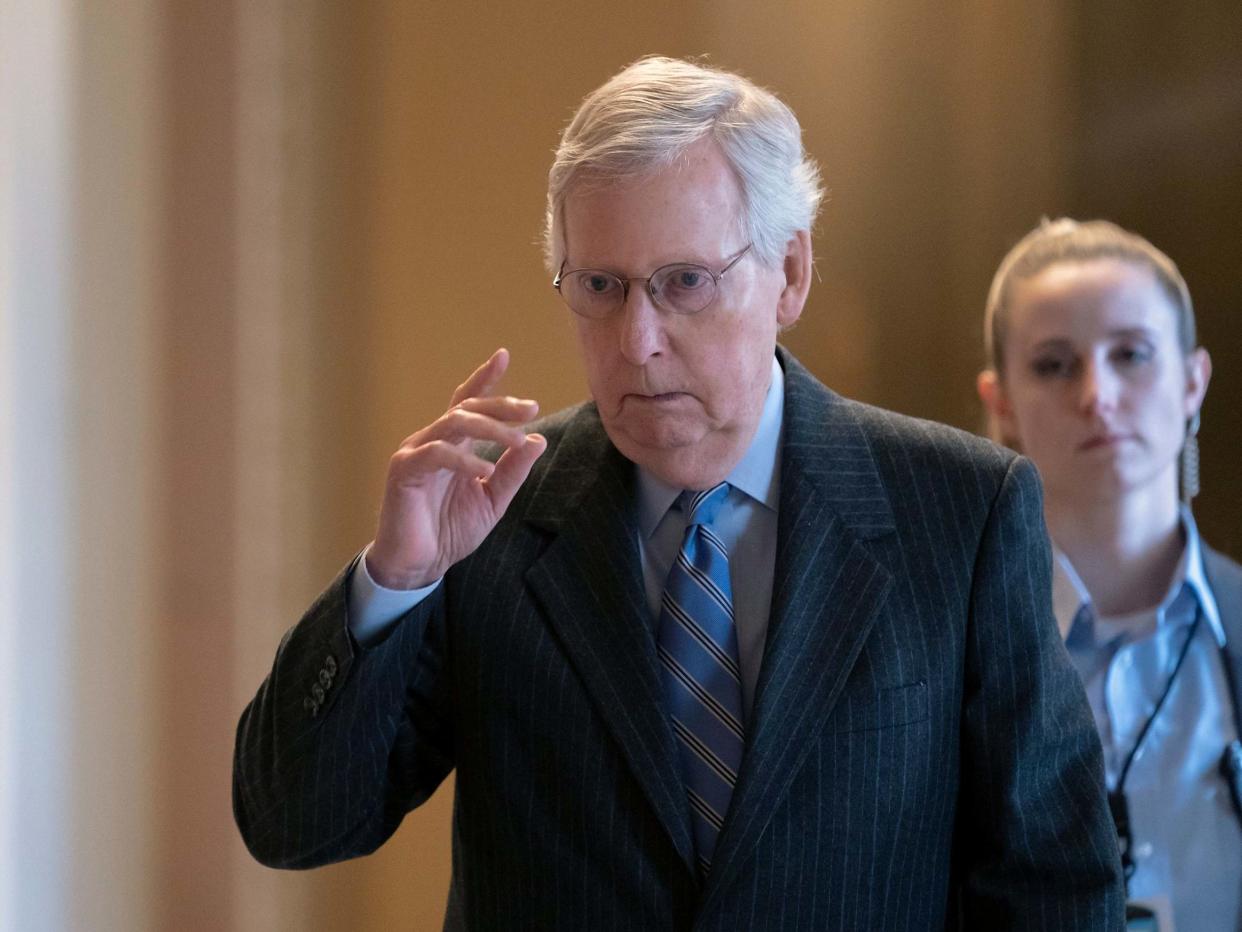Trump impeachment trial: What's next for Mitch McConnell and his hopes of keeping Republican Senate majority?

The seemingly inevitable acquittal of Donald Trump in the US Senate would mark just the end to a formal effort by Democrats to hold the president accountable for his actions, but the political ramifications could be felt well into the 2020 election.
In some respects, the acquittal would once again illustrate the remarkable level of control and support that Mr Trump has managed to attract since mounting his long shot bid for the presidency in 2015. Since that time, Mr Trump has managed an extraordinary consolidation of support among Republicans, culminating in Senate majority leader Mitch McConnell’s determined effort to fast-track the impeachment trial by barring further witnesses.
The strategy, though, does come with political risk, especially given the steady drip of new evidence that has emerged in the press. Those leaks continued even on Friday, hours before the witness vote in the Senate, with a report indicating John Bolton had claimed in his upcoming book that Mr Trump had personally been involved in the effort to coerce the Ukrainian government into investigating Joe Biden as early as last May.
It’s a defence of the president that has led many Democrats to cry foul, complaining that the effort represents a partisan circling of the wagons around a president who has been credibly accused of abusing his power and obstructing Congress, all the while refusing to provide new material evidence.
But even a victory in the Senate for Mr McConnell and Mr Trump could weigh heavy on the minds of voters some 10 months before the general election. So, then, could Mr McConnell’s strategy cost him control of the Senate — the legislative body that has helped Mr Trump to some of his greatest achievements including the appointment of over 100 conservative judges and, likely, acquittal?
As things stand, Republicans are facing a tougher 2020 electoral map than Democrats, who would need to pick up three seats to even the playing field (assuming they do not lose any, and that the two independents in the Senate who caucus with Democrats remain loyal).
All told, Republicans are defending 23 seats to the 12 that are being defended by Democrats. Just one of those Democratic seats is considered a “toss up” by the Cook Political report, that of Alabama’s Doug Jones. Meanwhile, three Republicans are in the “toss up” column — Martha McSally of Arizona, Cory Gardner of Colorado and Susan Collins of Maine.
That vulnerability meant that there was some question about whether some of those Republicans facing tough re-elections would vote for witnesses in the impeachment trial — a question that was resolved on Friday after Ms Collins said she would alongside Utah’s Mitt Romney, but no other Republicans did so, eliminating the possibility.
Those decisions were made even as signs have emerged showing that the American people were interested in hearing more about Mr Trump’s alleged misdeeds, and after Mr Bolton had said he would be willing to testify if subpoenaed.
Among those signs are the hundreds of protesters who flooded into the Senate on Wednesday to demand witnesses be called, and a recent poll by the respected Monmouth University showing that 75 per cent of voters want to hear from witnesses.
That seemingly losing battle for public sentiment has even been seen in fundraising by the two parties. The National Republican Congressional Committee posted record off-year fundraising totals in 2018 with $205.8 million raised, but the Democratic Congressional Campaign Committee topped even that with $296.4 million raised. So far in 2020, Democrats have also outdone Republicans by about $30 million in those same committees. All of this goes to say that it might be difficult for Republicans to regain the House in 2020, much less keep the Senate.
“They’re kicking our ass,” House minority leader Kevin McCarthy reportedly said during a closed door Republican meeting this week of the fundraising deficit.
As for Mr McConnell himself, his race appears to be safe — so far.
Up for re-election alongside Mr Trump, Mr McConnell is entering into the 2020 race with a “Likely Republican” ranking in the Cook Political Report, which is the second safest ranking.
But some troubling signs have emerged, and he may face a strong challenge from Democrat Amy McGrath (who, granted, is a longshot at this time). But, in 2018, Democratic gubernatorial candidate Andy Beshear managed to beat Trump-backed former governor Matt Bevin — who attempted to explicitly make the race a referendum on Trumpian politics.
Mr McConnell can certainly count on support from the president in the coming months, and has even received financial support from some of those who are representing Mr Trump before the Senate impeachment trial. Ken Starr, one of those legal team members, gave Mr McConnell the maximum allowed individual contribution in July, for instance, adding $2,800 to the campaign of a man whose last re-election bid became one of the most expensive in US Senate history.
Read more
What DC insiders really think of Mitch McConnell's trial rules
Mitch McConnell's impeachment 'trial' isn't a trial at all

